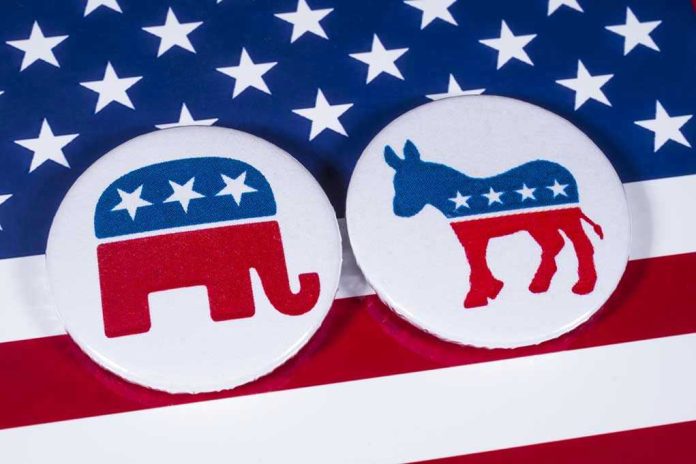
One accusation—whether true or not—can upend a political dynasty, and in New Jersey’s 2025 gubernatorial race, allegations of insider trading against Mikie Sherrill have turned a sleepy campaign into a battle for the soul of the state.
Story Snapshot
- Insider trading allegations threaten to reshape the New Jersey governor’s race.
- Mikie Sherrill’s detailed financial disclosures exceed legal requirements, but attacks persist.
- Republican PACs and viral media moments amplify skepticism and erode polling leads.
- Ambiguous disclosure rules and anti-elite sentiment fuel a broader debate on political ethics.
Allegations as a Political Weapon in a Blue State
Allegations of insider trading have dogged politicians for decades, but rarely have they landed with such force as in New Jersey’s 2025 gubernatorial contest. Mikie Sherrill, the Democratic frontrunner, finds herself battling more than just her Republican opponent Jack Ciattarelli—she’s fighting a narrative that transcends facts. The GOP’s Change New Jersey super PAC unleashed a summer blitz of attack ads, framing her as the latest member of Congress to profit off privileged information. The accusations, focused on stock trades made while Sherrill served on the House Armed Services Committee, have become a daily talking point on cable news and social media. In a state that’s reliably blue yet never immune to last-minute upsets, even the whiff of scandal can make the difference between victory and defeat.
Sherrill’s response has been both aggressive and meticulous. She released a level of financial transparency seldom seen in American politics, offering up not just the required broad ranges but exact dollar figures for her holdings. Her disclosures reveal no unusual gains from stock trades, a fact independently verified by several media outlets. Most of her family’s net worth growth, she argues, comes from her husband’s Wall Street compensation, not from congressional access. Yet, the ambiguity baked into congressional disclosure rules allows critics to cherry-pick numbers and imply wrongdoing. Attack ads and political operatives have seized on these ambiguities, calculating worst-case scenarios from the legally mandated value ranges and painting a picture of enrichment at taxpayers’ expense.
Historical Echoes and the Perennial Problem of Congressional Stock Trading
Sherrill’s predicament is the latest chapter in a long-running saga of congressional stock trading controversies. The 2012 STOCK Act was supposed to put an end to lawmakers profiting from nonpublic information, but loopholes and lax enforcement persist. The public’s skepticism is not unfounded: both parties have suffered black eyes when elected officials appeared to trade on privileged information during crises, from the 2008 financial meltdown to the early days of the COVID-19 pandemic. What makes Sherrill’s case stand out is her willingness to disclose far more than the law requires. Yet, in today’s climate, transparency can be a double-edged sword. The more detailed her financial picture, the more ammunition her opponents have to muddy the waters with half-truths and innuendo.
Viral moments have amplified the controversy. A pointed exchange on “The Breakfast Club” went viral, with Sherrill grilled over $7 million in trades. The first gubernatorial debate in September only intensified the scrutiny, with Ciattarelli’s team launching a dedicated website and digital ad campaign to keep the allegations alive. Each new media cycle brings a fresh round of outrage, and the public’s appetite for stories of political corruption remains insatiable.
Polling, Precedent, and the Razor’s Edge of Public Trust
Sherrill’s lead in the polls, once considered insurmountable for a Democrat in New Jersey, has narrowed as the controversy drags on. Her situation recalls the 2021 race, when Ciattarelli nearly pulled off an upset despite trailing in every major poll. Pollsters and political scientists warn that in an era of deep distrust toward political elites, even unfounded allegations can tip the balance—especially with undecided and swing voters. Attack ads may not need to prove actual criminality; they only have to sow enough doubt to depress turnout or push soft supporters to stay home.
Mikie Sherrill isn’t the first politician to face insider trading allegations — but it may cost her the NJ election https://t.co/JblAHfXgYn
— Spiritof1776 (@Spirtof76USA) October 26, 2025
Ethics experts, even those critical of congressional stock trading, concede that Sherrill’s actions—divesting individual stocks and using only ETFs—align with best practices for avoiding conflicts of interest. Review of her financial disclosures by independent media found no evidence of insider trading or unusual enrichment. Still, the optics are damaging, and the ambiguity of disclosure rules ensures the issue will linger. Republican-aligned sources continue to frame the matter as evidence of systemic corruption, while Democratic and independent analysts focus on the lack of actual wrongdoing and the rare transparency of Sherrill’s disclosures.
What’s at Stake for New Jersey and Beyond
The impact of the controversy extends well beyond campaign season. In the short term, it could cost Sherrill the election, energizing GOP turnout and depressing enthusiasm among Democrats. In the long term, the episode is likely to fuel calls for tighter stock trading rules and more rigorous financial disclosure requirements for public officials. New Jersey’s election serves as a national bellwether for how ethics, perception, and reality collide in modern politics. For voters, the saga is a test of whether transparency and facts can withstand the relentless churn of political messaging and digital misinformation.
The lesson for politicians everywhere: in the court of public opinion, perception is reality—and in a close race, even the shadow of a scandal can decide the outcome.




